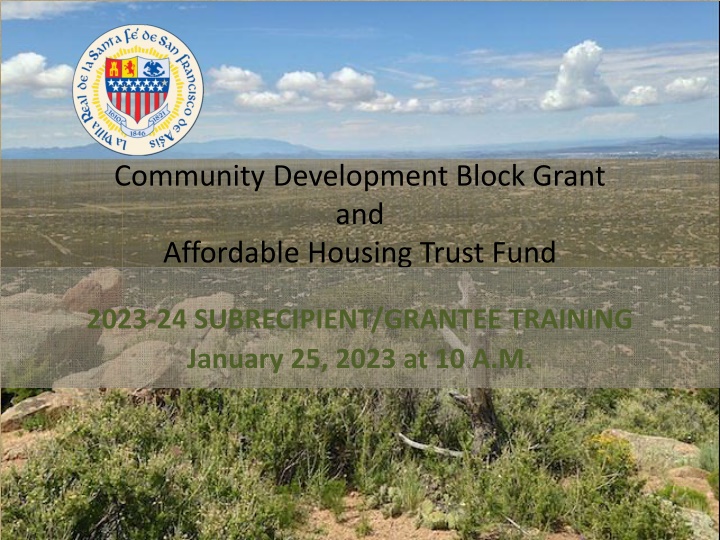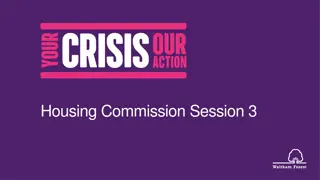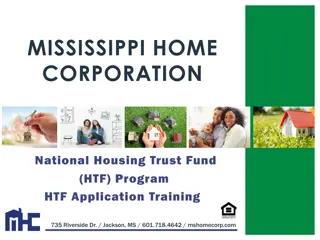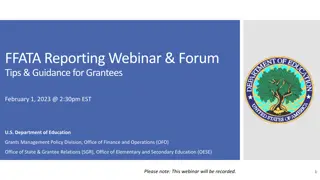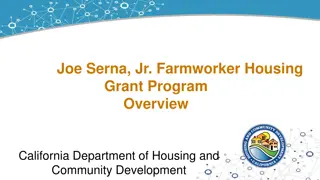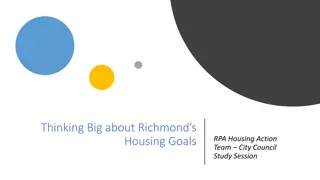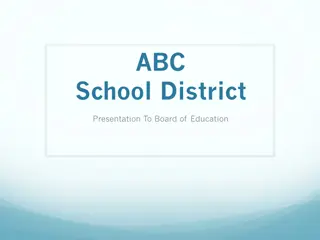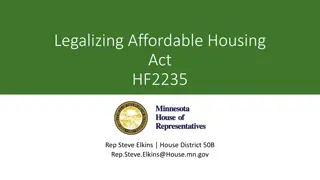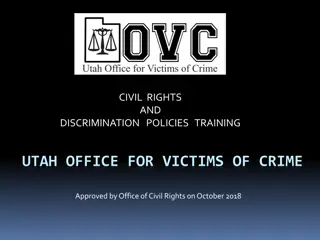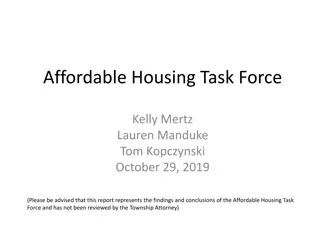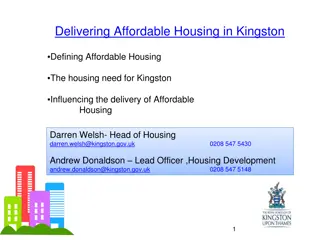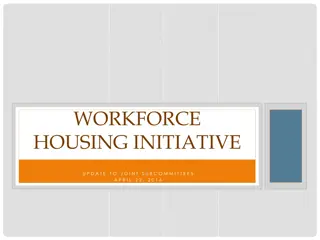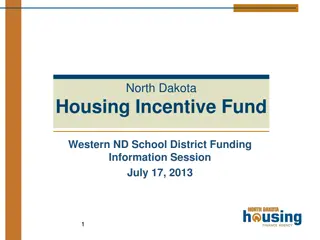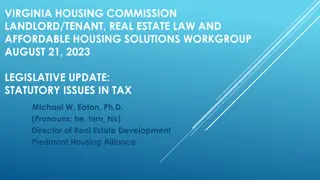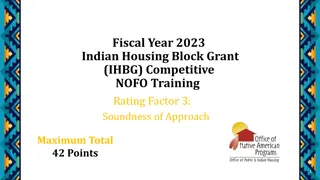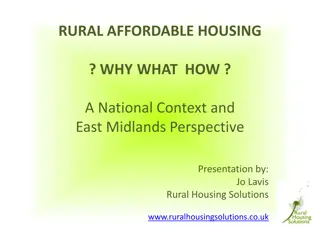Affordable Housing Trust Fund Training for Subrecipients and Grantees
January 25, 2023, marks a crucial training event for Community Development Block Grant and Affordable Housing Trust Fund subrecipients and grantees. The training covers essential topics like conflict of interest, contracting, procurement, financial systems, and more. Learn about the roles within the Office of Affordable Housing and understand the importance of compliance and reporting in housing initiatives. The event aims to equip participants with the necessary knowledge and tools to effectively manage funding and projects in line with HUD requirements.
Download Presentation

Please find below an Image/Link to download the presentation.
The content on the website is provided AS IS for your information and personal use only. It may not be sold, licensed, or shared on other websites without obtaining consent from the author.If you encounter any issues during the download, it is possible that the publisher has removed the file from their server.
You are allowed to download the files provided on this website for personal or commercial use, subject to the condition that they are used lawfully. All files are the property of their respective owners.
The content on the website is provided AS IS for your information and personal use only. It may not be sold, licensed, or shared on other websites without obtaining consent from the author.
E N D
Presentation Transcript
Community Development Block Grant and Affordable Housing Trust Fund 2023-24 SUBRECIPIENT/GRANTEE TRAINING January 25, 2023 at 10 A.M.
AGENDA WELCOME and INTRODUCTIONS CONFLICT OF INTEREST CONTRACTING, PROCUREMENT, FINANCIAL SYSTEMS, RECORD-KEEPING and INVOICING REPORTING and MONITORING RFAs and APPLICATION PROCESS COMMUNITY DEVELOPMENT BLOCK GRANT (CDBG) AFFORDABLE HOUSING TRUST FUND (AHTF)
OFFICE OF AFFORDABLE HOUSING LEAN AND (not so) MEAN = Four staff people (Roberta, Toni, Cody, Alexandra) PROVIDE FUNDING THROUGH THESE RFAS CONDUCT PLANNING, REPORTING, ACCOUNTING, MONITORING FUNCTIONS FOR FUNDING CONTRACTS AS REQUIRED BY HUD AND THE STATE OF NM ADMINISTER SANTA FE HOMES PROGRAM (INCLUSIONARY REQ M), ENSURE COMPLIANCE, MEMBER OF DRT REFERRAL TO SERVICE AND HOUSING PROVIDERS IN THE COMMUNITY RESEARCH, POLICY DEVELOPMENT, COMMUNITY ENGAGEMENT, AND OUTREACH RELATED TO HOUSING
Office of Affordable Housing Roles Contracting, invoicing, payments: Roberta Catanach, Contract Administrator: 505-316-4565 Email: rlcatanach@santafenm.gov Quarterly reporting, monitoring, general assistance: Toniette Candelaria Martinez, Project Specialist: 505-316-4634 Email: tocandelariamartinez@santafenm.gov ERRs, HUD reporting, general assistance: Cody Minnich, Housing Grants Manager 505-920-9733 Email: cjminnich@santafenm.gov Director of Office of Affordable Housing Alexandra Ladd, Email: agladd@santafenm.gov
CONFLICT OF INTEREST 24 CFR 570.611 CDBG CC Sections 1-7.5 and 1-7.7 AHTF and CDBG Applies to employees, agents, consultants, officers of the board, or elected/appointed officials of your organization who Exercise any functions or responsibilities related to CDBG/AHTF-funded activities Participate in decision-making processes Results in obtaining inside information, a financial interest or benefit as a result of a CDBG or AHTF activity for themselves or someone with immediate business or family ties, or any group the employee or their family is an officer or director (including social or charitable organizations).
CONTRACTING WITH THE CITY Once a funding amount is recommended by the CDC, a draft scope of work + amount is approved to form by CAO (includes CRS# + CoSF business license#); Register as vendorin City s upgraded Munis System ALL ORGS NEED TO RE-REGISTER as a VENDOR! https://santafenm.munisselfservice.com/Vendors/default.aspx City requires evidence of insurance ($1,000,000): general liability, professional liability, workers comp Contract is approved by Quality of Life (QOL) Committee, Finance Committee and City Council Executed contract and copy of PO will be sent to you which is your notice to proceed
FINANCIAL SYSTEMS City requires compliance with audit (or fiscal agent) with standard accounting systems with ability to create sources/uses reports; Must have organizational financial policies, procedures and organizational chart that shows fiscal internal control; Files should contain documentation of all expenses, invoices and procurement method; Files should show matching/leveraged sources of funds and system for tracking their uses.
PROCUREMENT Follow a free and open competitive process in securing products or services (CDBG funding must be used in compliance with 2 CFR 200) Properly document your purchasing activities and decisions Observe the special rules for particular kinds of purchases (small purchases, competitive sealed bids, competitive proposals, and sole source procurements) Properly bond and insure work involving large construction contracts and/or subcontracts Use local businesses and contract with small, minority and/or women-owned businesses to the maximum extent feasible
RECORD KEEPING Administrative records: personnel files; property management files; general program files (the subrecipient s application, the AHTF/CDBG Agreement, program policies and guidelines, correspondence with grantee and reports, etc.); Legal files (articles of incorporation, bylaws of the organization, tax status, board minutes, contracts, leases and other agreements); Financial records: described on previous slide Project/case files: Documentation of funded activities, individual beneficiaries, property owners, and/or properties, including income verification and determination of eligibility. Other records as required by the City
INVOICING Invoice submitted monthly; due NO LATER than 15th of the following month; Cover invoice, titled Invoice, referencing PO#, name of project, name/address of payee, contact person, shows use of funds to date and balance remaining; Provide brief narrative or reference to SOW as appropriate. Record expense (supporting documentation such as copies of invoices, payroll, timesheets, etc.) and provide proof of payment (canceled checks, bank statement); 10 days 2 weeks to process payment delayed if not all supporting documentation is received.
REPORTING Complete CDBG or AHTF reporting form (separate from invoice summary) and submit to City Submit quarterly report with description of progress to date according to scope of work, # of people served by AMI% and type of service provided, $ amount of assistance (no names, SSNs or any confidential info); Reporting due on the 15thof the following month: October 15, 2023 January 15, 2024 April 15, 2024 July 15, 2024 Provide success stories, copies of media coverage, event materials and the City will broadcast through its Public Information Office, Facebook, TV/radio/podcasts.
MONITORING Following end of program year, you will receive monitoring/site visit notification that describes area to be monitored; A self-reporting form will be filled out and submitted to City which will be used as basis for site visit; Areas monitored include: participant eligibility, financial systems, program/project outcomes, proposed program improvements for future funding, and compliance with federal regulations (CDBG only) including: fair housing policies, lead-based paint, Section 3, other federal regulations; Follow up letter sent within 30 days after site visit; Grantee/subrecipient has 30 days to respond.
REQUEST FOR APPLICATION Request for Application (RFA) requires the submittal of several documents + the Applicationfor funds which is specific per funding source. Responses will be evaluated according to specific criteria (also specific to funding source). RFAs are available on the City s website and OAH website. Questions may be submitted to cjminnich@santafenm.gov. Answers will be made available on the OAH website. All interested applicants who have submitted a nonbinding letter of intent will be notified when information is updated or if amendments to the RFA are made.
RFA Important Dates January 25: Subrecipient/Grantee training February 13: Last day to submit written questions (cjminnich@santafenm.gov) February 17: Submittals DUE @ 5pm ELECTRONIC SUBMITTAL ONLY to: cjminnich@santafenm.gov (25MB LIMIT!) March 1, 8:30am 3:30pm: Applicant Presentations (15 min/project) to the Community Development Commission via Zoom (Schedule TBD)
CDBG OVERVIEW The City of Santa Fe is one of five entitlement communities in New Mexico as classified by Department of Housing and Urban Development (HUD). Entitlement communities can develop their own programs and funding priorities as long as their programs conform to HUD s CDBG statutory standards and program regulations. ALL CDBG subrecipients are held to the same level of oversight and regulation as the entitlement grantee (the City of Santa Fe) as enforced through agreement with City. Funded activities must support the objectives of the five- year Consolidated Plan which is updated annually through the Annual Action Plan which informs the public about the use of federal funds. Available on the OAH webpage.
NATIONAL OBJECTIVES Use of funds must be eligible and meet at least one national objective: Benefit to low- and moderate-income (LMI) persons; Aid in the prevention or elimination of slums or blight; Meet a need having a particular urgency (referred to as urgent need). Santa Fe uses its funds exclusively for LMI benefit. Amount of grant averages $600,000 per year 20% reserved for administrative costs (approx. $120,000) 15% cap for public services (approx. $90,000)
CON PLAN GOALS - DRAFT Goal 1: Chronic homelessness is ended or made temporary Goal 2: Housing stability for all residents of Santa Fe Goal 3: Expanded choices for affordable rental opportunities to meet a diversity of needs Goal 4: Expanded choices for affordable home buying opportunities for a low- and moderate income households Goal 5: Homeownership is affordable in the long term and economically/ecologically sustainable Goal 6: Social determinants of health are improved
ELIGIBILITY OF USES Acquisition, disposition, remediation of property for public uses for LMI populations Public facilities and improvements Public services (15% cap) directly related to housing needs, particularly those who are precariously housed, experiencing homelessness or at risk of homelessness Infrastructure (water/sewer lines, streets and sidewalks) in a low/mod census tract or for new affordable housing Housing rehabilitation for rental properties and LMI areas Construction of new units is generally NOT allowed Homeownership assistance (mortgage principal buydown loans, home repair assistance)
EVALUATION CRITERIA Funding feasibility (weighted value = 40%): Does the proposed use address a demonstrated need? Is a special needs population served? Does project/programming demonstrate compliance with local plans, priorities, codes, collaboration with other agencies, programs, etc. as necessary Performance measurement/work plan (weighted value = 25%): Are performance measurements, outcomes, and proposed outcomes well presented? Realistic? Well-supported in the application? Organizational Capability & Mgt (weighted value = 35%): Does the applicant demonstrate adequate organizational experience, expertise in the proposed type(s) of housing or assistance? Is applicant financially sound? Does it have experience with federal awards? Other housing funds?
DAVIS-BACONKEY POINTS Davis-Bacon is triggered when construction work over $2,000 is financed in whole or in part with CDBG funds. All bid documents, contracts, and subcontracts should reference Federal Labor Standards and Davis-Bacon wage decision. CDBG subrecipient must have a contract with their contractor. You must ensure contractor is eligible (not debarred) for federal work. http://www.sam.gov and select Search Records . The most recent Davis-Bacon Wage Decision & Notice to All Employees must be posted at the job site. The City will conduct onsite inspections and interviews with employees of the contractor/subcontractor to ensure that prevailing rates are paid. Contractor must submit payroll reports to the Subrecipient on a weekly basis which is then submitted to the City with invoices.
FAIR HOUSING U.S. Fair Housing Act, Title VIII of the Civil Rights act of 1968, as amended, which prohibits discrimination because of membership in a protected class - race, color, religion, national origin, sex, familial status and disability Santa Fe s city code also has a Fair Housing section, which includes sexual orientation as a protected class: SFCC 26-4 Applies to all housing-related transactions, including purchase, rent, appraisal, insurance, and advertisement HUD Fair Housing Equal Opportunity (FHEO) resource list available: https://www.hud.gov/program_offices/fair_housing_equal_o pp/fair_housing_resources
SECTION 3 - 24 CFR Part 135 The Section 3 regulations apply to projects receiving federal financial assistance in excess of $200,000 expended for: (1) housing rehabilitation (including abatement of lead-based paint hazards); (2) housing construction; or (3) other public construction projects. Section 3residents include public housing residents and low and very low income residents who live in the area where HUD-assisted activities are located. Section 3 businesses are defined: 51% ownership are Section 3 residents; or whose full-time employees (30%) are Section 3 residents; or is committed to subcontracting at least 25% of federal award to Section 3 businesses.
Build America, Buy America Enacted as part of the Infrastructure Investment and Jobs Act on Nov 15, 2021, BABA establishes a domestic content procurement preference for all federal financially assisted infrastructure projects - $250,000+. All iron, steel, manufactured products and construction materials need to be produced in the US. Waive the domestic procurement preference if: A waiver is in the public interest The types of products are not produced in the US in sufficient, reasonably available, or satisfactory quality Domestic preference would increase the cost of overall project by more than 25 percent
ENVIRONMENTAL REVIEWS Conducted prior to work being performed to assess potential environmental impacts and establish that no adverse effects on end users (applies to program income funded activities) City is Responsible Entity (RE) and determines level of review Exempt projects (public services) have a limited level of review Tiered Assessments are required for public facilities and when a repetitive activity is carried out in variety of locations (Down Payment and Home Repair) Public Notice of 15-17 Day Review Period Required for projects subject to site specific reviews prior to City requesting Release of Funds (RROF) from HUD.
ENVIRONMENTAL REVIEWS Mortgage Principal Reduction Request for review must be sent in at least 2 weeks (3 weeks is better!) prior to closing: SSR Checklist Appraisal Flood Certification Income Certification Location (w/date of construction) Cover Form w/Requested Amount **ERRs must be approved by the City before invoices are submitted** Home Repair Projects Tier II Must obtain approval from NM Historic Preservation Division (can add 2 weeks+ to the process) SSR Checklist Income Certification Lead Paint Non- Disturbance Location map Quotes Submitted with Before Pictures Before/After pictures
AHTF OVERVIEW NM Affordable Housing Act provides exemption to the Anti-Donation Clause to allow the provision of public resources (land, infrastructure, buildings, direct financial assistance) for the purposes of providing affordable housing to income- eligible recipients NM Mortgage Finance Authority provides oversight of public donations to ensure compliance with the Act. Codified in City of Santa Fe Code = SFCC 26-3 Funded activities must support the objectives of the five- year Affordable Housing Plan which provides an in-depth analysis of housing needs by type, income, and location. Available on the OAH webpage.
ELIGIBILITY OF USES NOT ALLOWED Admin, organizational, or services costs Rental vouchers Provide rental assistance vouchers to renters earning less than 80% AMI (60% is target) and must be in City limits Emergency shelter facilities Development, construction, improvement, preservation of shelter facilities, and operational costs Provision of rental units for Low Income (up to 60 % AMI) and Extremely Low Income Renters (less than 30% AMI) acquisition, conversion, preservation and new construction of multi-income supported rental units; including infrastructure
ELIGIBILITY OF USES Down payment assistance DPA in the form of soft- second mortgage that buys down principal amount of loan to lower monthly payment; acquisition, conversion, preservation and new construction of homeownership housing; Homeowner Rehabilitation Programs, Energy Efficiency Upgrades, Accessibility Retrofits Acquisition, conversion, and preservation of affordable housing that accommodates needs of current homeowners with incomes that do not exceed 120% AMI.
ELIGIBLE APPLICANTS All regional housing authorities, tribal governments, tribal housing agencies, and any governmental housing agencies; All for-profit organizations, including any corporation, limited liability company, partnership, joint venture, syndicate, or association with a mission to provide affordable housing; or, Nonprofit organizations with a mission to provide affordable housing & related services.
EVALUATION CRITERIA Funding Feasibility weighted value = 20% Budget Narrative demonstrates leverage amounts from other sources, operating budget shows evidence of sufficient revenue to administer the proposed program, matching resources are secured. Need/Benefit & Project Feasibility weighted value = 50% The proposal is responsive to current and future market demand, Income mix, if applicable, Site control, if applicable, Realistic time frame for completion of proposed project/program activities, Proposed use of funds addresses underlying/systemic challenges in the community Organizational Capability/Mgt weighted value = 30% The proposal demonstrates staff capacity and expertise, organizational experience, expertise in type(s) of housing or service(s) proposed, demonstrated financial soundness
LEVERAGE VS. MATCH For every $1 of AHTF, applicant must demonstrate $3 from matching or leveraged sources. A match is the amount the applicant will contribute in cash or in-kind goods and services to the project Leverage is the additional financial support from outside resources that the applicant brings to the project; this can be cash, government, private funds, or in-kind services provided by an outside entity.
THANK YOU! Contracting, invoicing, payments: Roberta Catanach, Contract Administrator: 505-316-4565 Email: rlcatanach@santafenm.gov Quarterly reporting, ERRs general assistance: Toniette Candelaria Martinez, Project Specialist: 505-316-4634 Email: tocandelariamartinez@santafenm.gov Monitoring, HUD reporting, general assistance: Cody Minnich, Housing Grants Manager Email: cjminnich@santafenm.gov Alexandra Ladd, Director of Office of Affordable Housing Email: agladd@santafenm.gov
